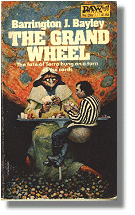 |
This review is available here by kind
courtesy of the author and Edward James. Originally
published in "Foundation 18", in January 1980.
Copyright Colin Greenland, 1980-1999.
THE GRAND WHEEL by Barrington J. Bayley.
Fontana, 1979, 160pp, £0.80, ISBN 0 00 614863 8.
reviewed by Colin Greenland
Bayley
dashes off one for the market: DAW Books, 1977, but who
would have thought it? This book would have been old in
1957, and the Syndicate fantasy dates from a lot earlier.
You remember - the green baize, the marked deck, the
bourbon, the moll, the rival mob, the raid, and the evil
but fascinating aura of the criminal mastermind
entertaining himself in his paranoid backgroom. Period
stuff, but all thoughlessly relegated hundreds of years
hence so that period feel is lost in transit and Bayley
misses his last chance of an appeal to imagination. The
Grand Wheel is as void of atmosphere as a deserted
asteroid.
For the first chapter, which contains one of the book's
two jokes and its one idea, it looked as though Bayley
was trying, at least a little. The empire of men
throughout the universe is in the grip of two
organisations. The legitimacy, which runs it, consists of
the politicians and the police and manifests what
Burroughs calls "the control of habit". The
Grand Wheel, its opposition, is a secret criminal cartel
of gambling fiends with hooded eyes, brains like
computers, and the fevered urge to stake their
grandmothers - heck, other people's grandmothers - on the
flip of a card. meanwhile the whole intergalactic
caboodle is under threat of war from the Hadranics -
aliens from outer space! Our hero is Cheyne Scarne, or
rather ought to be, but a hero ought to be at least
interesting. Cheyne Scarne, his stand-in, is a master
gambler pressganged into spying for the Legitimacy, who
aren't so legitimate after all (did you guess?) because
they've hooked him on a drug only they can supply. Scarne
is also a professor of randomatics, which is Bayley's one
idea in the good old tradition of sf ideas; viz. below a
certain number in the billions, numbers generated
independently are not random, but conform to runs and
groups that can be analysed and predicted by the new
randomatics calculus. "The mythical system once
sought by cranks and eccentrics became, therefore, a
scientific fact". Yes! Glimmer of interest!
Mathematical nonsense, of course, but that wouldn't
matter in a science fiction story, would it?
What does matter is that the idea is entirely
underdeveloped. The only function of randomatics in the
plot is to provide for the fact that games have got much
more complicated in this future, which we might have
expected anyway. Muggers, the equivalent of one-armed
bandits, operate by tracking the movement of sub-atomic
particles and the like, to push the variables down below
the predictability threshold. Scarne's professorship
doesn't give him any special advantages, or even any
particularly different attitudes, to games or to life.
Recalling Bayley stories like "Four-Colour
Problem", "The Exploration of Space", and
"Me and My Antronoscope", I'd expected
something very much more cerebral, playing off
philosophies on a chessboard of stars - the stochastic,
the calculable; the anarchic, the controlled; Life is
random, Life is determined - the sort of thing Charles
Harness used to do. There's an interesting vision in
chapter six, based on the Tarot picture of the Wheel of
Fortune: the material world of chance and change is
afloat on an infinite sea of "pure randomness",
below the quantum level, "where no physical laws
obtain". But apart from a few dizzy spells and a few
inexplicable fits of righteous protest, the revelation
doesn't seem to influence Scarne at all. The metaphysical
version of the book is latent, somewhere here, but I
expect Bayley didn't have the time or the urge to write
it. Instead he gave DAW this listless spy story, leaden
with explanation, dressed up as sf, with a plot you don't
need a degree in randomatics to predict.
- Colin Greenland, 1980
thanks
to Andy Sawyer
read more about FOUNDATION
[reviews][home]
|
